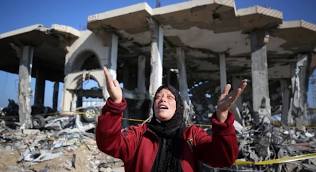Claims of GENOCIDE against Israel, sure to send shockwaves and divisiveness amongst UN.
- By : James Bryson
- Category : International Relations, World Events

The spiral of violence and death suffered by the Gaza Strip reached a new stage after South Africa presented a lawsuit against Israel before the International Court of Justice (ICJ) for the possible commission of the crime of genocide against the Palestinian population.
In the opinion of Edoardo Stoppioni, researcher and professor of international law at the University of Strasbourg, the case and the possible ruling of the ICJ pose a challenge to the main judicial body of the UN, arising precisely from the horrors of the Second World War, the Holocaust and the atrocities committed then by the Nazis and their allies.
“It is one of the rulings that will question international law. “How are we going to talk about ‘the crime of crimes’: genocide, it is a ruling with a profound historical, political and legal burden,” Stoppioni said about the implications of the case, this Tuesday on the front page of La Estrella de Panamá.
The jurist explained that unlike other types of crimes against humanity, genocide – whose prevention and punishment is enshrined in a 1948 Convention ratified by 152 countries including Israel – involves the total or partial destruction of a national, racial, religious group. or ethnic.
The essence of the South African demand alleges that Tel Aviv would seek the eradication of the Palestinian people from Gaza, which would be criminal conduct and therefore punishable under international regulations. Regarding this, he indicated that the process could advance in two states, in the first – immediate action – the judges have to determine if there is a need for provisional measures. That is, they dictate actions to protect the Palestinian population and not worsen the situation. If said mandate is issued, they are mandatory.
The second, more complicated and which could extend for years, has to do with the substance of the litigation, the commission of genocidal acts against the Palestinians in Gaza, an accusation that Israel rejects and assures that it is only acting in “legitimate defense”, something that South Africa considers that it does not apply here and that they would rather be seeking to reinforce the occupation of the Palestinian territories.
The academic highlighted that although the lawsuit is framed in the judicial space, when justice is administered the process enters the political sphere, since it is the Security Council that must comply with the ruling. A space dominated by five powers with veto power and in which open opposition could be anticipated from the US, an ally of Israel and opposed to the trial.
Despite this, Stoppioni considers that a sentence of this nature would continue to have great weight by “breaking the silence” in the face of a crime and identifying a State that does not respect international law. Even within Israel it would have consequences in the opinion of the university professor, in particular the internal tension between the political forces that support Prime Minister Benjamin Netanyahu and the Israeli justice bodies.
“This is taking place in a context in which Netanyahu internally is trying to devalue the role of the courts and the role of judicial control over power. We have seen it with the role of the Supreme Court of Israel which has been a fundamental body for democracy in the country,” he said.
The crisis worsened on October 7 after the attack by Hamas militias in the Palestinian territories occupied by Israel – an attack that left at least 1,239 Israelis dead and dozens of hostages. Since then more than 23,084 Palestinians have been killed under Israeli attacks, of which at least 10,000 are children.



No Comments